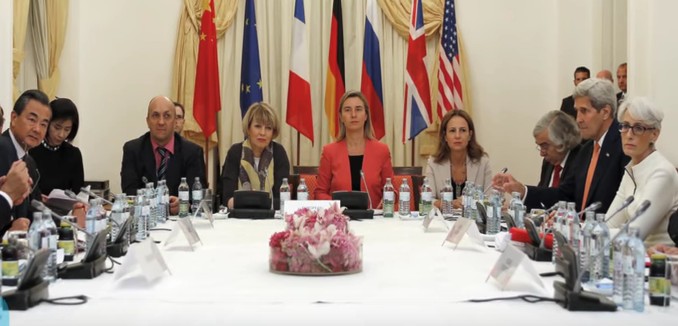A comparison of two op-eds by European political leaders, one written ten years ago today and one written earlier this month, show a marked shift in attitudes towards Iran and its nuclear program. Ten years ago, the EU and constituent countries were willing to confront Iran over its deceptions and demand that it reverse its nuclear program. But now Europe’s leaders have accepted Iran’s cheating and are seeking merely to contain its nuclear program.
The first op-ed (Google link), written for The Wall Street Journal by the foreign policy chief of the European Union and the foreign ministers of Britain, France, and Germany, observed that “there are serious grounds for concern that Iran’s nuclear ambitions may not be exclusively peaceful.” The authors cited the International Atomic Energy Agency, which charged that “Iran’s policy of concealment … resulted in many breaches of its obligations” under the Nuclear Nonproliferation Treaty (NPT).
The diplomats rejected Iran’s claim that it needed a domestic nuclear enrichment program, noting that, at the time, it had no reactor that required enriched uranium, and that 31 other nations found it satisfactory to merely own civilian reactors and purchase their enriched uranium from other nations. Furthermore, the op-ed charged that Iran was “found to have worked with the same secret network that helped Libya and North Korea develop clandestine nuclear weapons programs.”
In addition to citing these reasons for skepticism about Iran’s nuclear program, the foreign ministers faulted Iran for breaking an agreement with the EU that called for closer cooperation in exchange for Iran scaling back its nuclear program. This agreement was made in November 2004, but Iran broke it in August 2005 when it restarted its uranium conversion plant.
Though the European diplomats called for cooperation from Iran, none was forthcoming. Without “full transparency from Iran,” they wrote, “the proliferation risks if Iran continues on its current path are very great.” Iran’s continued deceptions and violations after that point led to a series of United Nations Security Council Resolutions imposed on it for its violation of the NPT.
In contrast, David Cameron, Francois Hollande, and Angela Merkel, the current heads of government of Britain, France, and Germany, wrote an op-ed in The Washington Post two weeks ago supporting the recently concluded nuclear deal with Iran. In their op-ed, Cameron, Hollande, and Merkel made no explicit mention of Iran’s past nuclear subterfuges or its violations of the NPT.
Perhaps the key paragraph is here:
We fully support this agreement because it achieves the goals we had set ourselves. It deals with the uranium enrichment route to a bomb by requiring Iran to reduce by 98 percent its stockpile of enriched uranium; to lower by two-thirds the number of its centrifuges; to limit uranium enrichment levels; and to stop using the deep Fordow site for enrichment. It closes the plutonium route through changes to the Arak reactor so that it does not produce weapons-grade plutonium. And it ensures the IAEA enhanced access not only to Iran’s nuclear facilities and the entire nuclear fuel cycle but also, where needed, to any undeclared site.
A focus of the first op-ed was on Iran’s uranium enrichment program in defiance of the international community, but now Iran’s uranium enrichment is accepted. Furthermore, while Cameron, Hollande, and Merkel write about Iran hypothetically cheating in the future, warning that “the near certainty of getting caught and the consequences that would follow would make this a losing option,” they never explicitly mention Iran’s past violations.
However, by allowing Iran to retain an enrichment capacity, the nuclear deal effectively rewards it for its past cheating, undermining the credibility of any threats against it cheating in the future.
It’s also telling that ten years ago, the European approach to Iran was presented as a response to Iran explicitly “breaking” agreements and “defy[ing] the international community,” the new agreement is presented merely as a response to a threat presented by Iran. This further reinforces the perception that Iran did not pay a price for its past violations and cheating. New York Times columnist Thomas Friedman, a supporter of the deal, expressed similar sentiments last week, writing that the deal got “the world to bless Iran’s ‘peaceful’ nuclear enrichment program, even though it cheated its way there.”
In ten years, the world has gone from fighting Iran’s centrifuge subterfuges to accepting and even rewarding them.
[Photo: wochit News / YouTube ]




